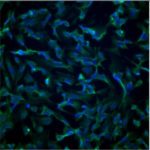Lien vers Pubmed [PMID] – 27956110
Biochem. Pharmacol. 2017 04;129:1-13
DNA methylation is a mammalian epigenetic mark that participates to define where and when genes are expressed, both in normal cells and in the context of diseases. Like other epigenetic marks, it is reversible and can be modulated by chemical agents. Because it plays an important role in cancer by silencing certain genes, such as tumour suppressor genes, it is a promising therapeutic target. Two compounds are already approved to treat haematological cancers, and many efforts have been carried out to discover new molecules that inhibit DNA methyltransferases, the enzymes responsible for DNA methylation. Here, we analyse the molecular mechanisms and cellular pharmacology of these inhibitors, pointing out the necessity for new pharmacological models and paradigms. The parameters of pharmacological responses need to be redefined: the aim is cellular reprogramming rather than general cytotoxicity. Thus, “epigenetic” rather than cytotoxic dosages are defined. Another issue is the delay of the response: cellular reprogramming can take several generations to produce observable phenotypes. Is this compatible with laboratory scale experiments? Finally, it is important to consider the specificity for cancer cells compared to normal cells and the appearance of resistance. We also discuss different techniques that are used and the selection of pharmacological models.

